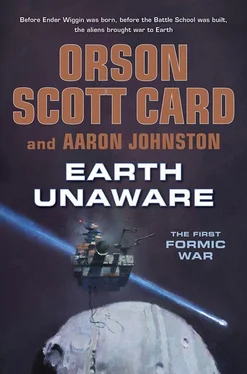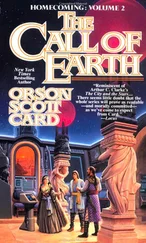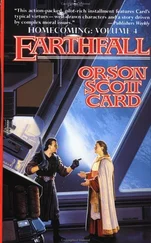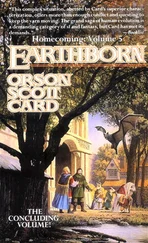Orson Card - Earth unavare
Здесь есть возможность читать онлайн «Orson Card - Earth unavare» весь текст электронной книги совершенно бесплатно (целиком полную версию без сокращений). В некоторых случаях можно слушать аудио, скачать через торрент в формате fb2 и присутствует краткое содержание. Жанр: Фантастика и фэнтези, на английском языке. Описание произведения, (предисловие) а так же отзывы посетителей доступны на портале библиотеки ЛибКат.
- Название:Earth unavare
- Автор:
- Жанр:
- Год:неизвестен
- ISBN:нет данных
- Рейтинг книги:5 / 5. Голосов: 1
-
Избранное:Добавить в избранное
- Отзывы:
-
Ваша оценка:
- 100
- 1
- 2
- 3
- 4
- 5
Earth unavare: краткое содержание, описание и аннотация
Предлагаем к чтению аннотацию, описание, краткое содержание или предисловие (зависит от того, что написал сам автор книги «Earth unavare»). Если вы не нашли необходимую информацию о книге — напишите в комментариях, мы постараемся отыскать её.
Earth unavare — читать онлайн бесплатно полную книгу (весь текст) целиком
Ниже представлен текст книги, разбитый по страницам. Система сохранения места последней прочитанной страницы, позволяет с удобством читать онлайн бесплатно книгу «Earth unavare», без необходимости каждый раз заново искать на чём Вы остановились. Поставьте закладку, и сможете в любой момент перейти на страницу, на которой закончили чтение.
Интервал:
Закладка:
But that was free miners. He respected their courage. But to ignore self-preservation for the sake of family didn’t feel noble. It felt irresponsible.
There was one more thing, too. One he tried not to think about, since it made him feel shallow and callous. But there was no denying it either: The destruction of El Cavador meant the destruction of their copy of his files. Concepcion had said she would erase them, but now he knew without a doubt that it had happened. There was the slim possibility that one of the women had carried a copy onto the WU-HU ship, but that was unlikely. They were worried about protecting their children and surviving. Burning Lem Jukes at the legal stake hadn’t been on their minds. He was in the clear. The files were gone.
“My point is,” Dublin was saying, “we don’t yet know why they’re headed to Earth. What do they want? Our resources? To make contact? To study us?”
“They didn’t come to make contact,” said Lem. “Their pod destroyed the Italian free miners.”
“Yes,” said Dublin, “but only after it had been among them for twelve hours. Maybe it was trying to contact them in all that time.”
Lem shook his head. “Concepcion told us everything. The Italians didn’t pick up anything that resembled communication from the pod.”
“Maybe they have a way of communicating that we don’t know about,” said Dublin. “Maybe they were trying to communicate, but humans don’t have the tech to receive their transmissions.”
“They killed the Italians,” said Chubs. “If someone doesn’t answer your hello, you don’t waste them.”
“I’m trying to look at this scientifically,” said Dublin.
“It doesn’t matter if they tried to communicate or not,” said Chubs. “They wanted to kill us. Did you watch the vids? Did you see the face of that Formic climbing up the mooring cable? It wasn’t coming to introduce itself. It was coming to rip Lem’s head off.”
Dublin held up two hands in a gesture of surrender. “I’m not defending them. I’m reminding us that they come from a completely different social structure with completely different behaviors and values.”
“There is one theory we haven’t discussed,” said Benyawe. She walked to the sketch of the Formic ship on the wall, studied it, then faced them. “What if it’s a colony ship?”
“Colony?” said Chubs. “Can’t be. The planet’s taken. We own it. No vacancy.”
“Maybe they don’t care,” said Benyawe. “Maybe they come from a civilization where aliens share planets.”
“Or maybe they intend to take it for themselves,” said Lem. He turned and studied the diagram of the Formic. “We’ve been assuming all this time that they consider us as equals. But what if they don’t? What if they think of us in the same way we think of houseflies or rabbits? If you want to build a house on a lot and you find a family of rabbits living on the land, you don’t think of the land as belonging to the rabbits and build elsewhere. You shoot the rabbits or you scare them off.”
“There are twelve billion people on Earth,” said Chubs. “With cities and industry and tech. That’s more than a family of rabbits.”
“Fine. Pick a different animal. Say, earthworms. How many worms are on the plot of land? Thousands? Tens of thousands? Or what about ants? A million? They have colonies and homes, but what do we care? We level the land and build anyway. My point is, maybe they don’t consider the planet ours. We only happen to live there. Maybe they see it as theirs for the taking.”
“There’s a hole in that theory,” said Dublin. “The interference. If the Formics didn’t consider as us equals or at least near their place on the species hierarchy, why are they working so hard to cloak their approach with the interference? What they’re doing to our radio suggests they fear us and have developed tactics to avoid our detection. It implies they consider us a threat.”
“Only if the interference is deliberate,” said Lem. “But what if it isn’t? What if it’s nothing more than a by-product of their propulsion system? What if they have no idea they’re wrecking our radio? Yes, it’s working to their advantage, but that doesn’t mean they meant for it to happen.”
“If that’s true,” said Benyawe, “then Earth is in more danger than we thought. If the Formics aren’t doing anything deliberate to hide their approach, if they don’t care if we notice them or not, then they don’t consider us a threat at all. They’re so confident they can destroy us that it doesn’t matter if we know they’re coming.”
The more they talked, the less Lem liked what we he was hearing. “So what do we do?” he asked. “We can’t communicate with anyone. We can’t surpass the ship and get ahead of it-not at its current speed anyway. It’s moving too fast. We can’t even catch it if we wanted to.”
“Which we most definitely don’t want to do,” said Chubs.
“I see two options,” said Benyawe. “We can either deviate and take a gamble that there’s a way out of this interference. Or we can continue to track the ship and gather intelligence and hope that it decelerates enough for us to zip past it and beat it to Earth.”
“Also a gamble,” said Lem.
“There’s no easy answer,” said Benyawe.
“Option B gets my vote,” said Dublin. “That puts us closer to Earth. That’s our destination.”
“I agree,” said Benyawe. “There might be something else we can learn about the Formics, a weakness perhaps. That would be more valuable to Earth than anything. If we lose sight of the ship, we lose that chance.”
“The Formics are leaving a wake of destruction,” said Chubs. “People may need help. I say we stay the course.”
Benyawe said, “An odd philosophy for you, considering you’ve left quite a wake of destruction yourself.”
“Always to protect us,” said Chubs, annoyed.
A navigator from the helm appeared on the wall-screen. “Sir, sensors indicate that the Formic ship has vented again.”
“Decelerate immediately,” said Lem. “I don’t want us flying into the gamma plasma. Bring us to a full stop if necessary.” It was the second time the ship had vented since the battle with El Cavador.
The navigator made a series of hand movements offscreen, then returned. “Deceleration commenced, sir.”
“Were there any ships near the Formics that may have been affected by the plasma?”
“Don’t know, sir. The only reason we can detect the Formic ship at this distance is because of its size. Anything smaller doesn’t show up on the sensors.”
“Keep scanning. Let me know if we find anything that might have been hit by the plasma.”
“Yes, sir.”
The navigator disappeared. Benyawe walked to the systems chart that stretched across one wall. A line representing the Formics’ trajectory cut across space. Benyawe touched various points on the line, leaving blinking red dots. “The first venting happened here, near Weigh Station Four. The next venting was here, roughly six au later. Now we have a third venting that’s approximately six au after that.”
“So they vent every six au,” said Dublin.
“Which means we can approximate where it will likely vent again,” said Benyawe. She tapped her finger down the line every six au and left more dots. As she reached the inner Belt, she placed a dot near an asteroid.
“What asteroid is that?” asked Lem.
Benyawe enlarged it until it filled the screen. Lem thought it looked like a dog bone: thin shaft in the middle, with two knobby lobes at either end. “It’s called Kleopatra,” said Benyawe. “M-class. Measures two hundred and seventeen kilometers across. She moved her fingers on the screen and rotated the asteroid until the opposite side came into view. There, on the surface of one of the lobes, was a small cluster of lights.
Читать дальшеИнтервал:
Закладка:
Похожие книги на «Earth unavare»
Представляем Вашему вниманию похожие книги на «Earth unavare» списком для выбора. Мы отобрали схожую по названию и смыслу литературу в надежде предоставить читателям больше вариантов отыскать новые, интересные, ещё непрочитанные произведения.
Обсуждение, отзывы о книге «Earth unavare» и просто собственные мнения читателей. Оставьте ваши комментарии, напишите, что Вы думаете о произведении, его смысле или главных героях. Укажите что конкретно понравилось, а что нет, и почему Вы так считаете.











